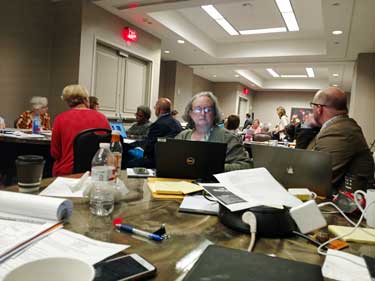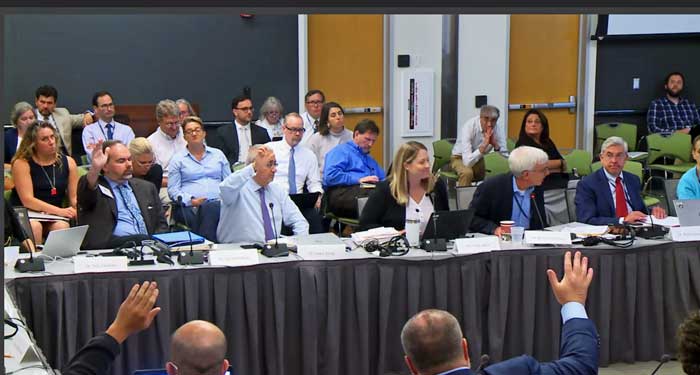

Beginnings

Vicky Whittemore – seen at a CDC meeting – appears to have been working up to this point for several years.
In 2016, Vicky Whittemore asserted before NANDSC (the National Advisory Council for the Institute for Neurological Disorders and Stroke (NINDS)) that a desperate need existed to bolster research for chronic fatigue syndrome (ME/CFS). (NANDSC Council is the council through which all funding awards at NINDS, including research grants, training grants, and career development awards as well as initiatives, must pass.)
Whittemore talked about the need to put ME/CFS funding on par with funding for other disorders, the need for training grants for new researchers, etc. and noted how few doctors were able to treat the disease. The goal was simply to get the Council to agree to the possibility that ME/CFS needed more funding. Without that agreement, it would have been impossible for Whittemore to lay the groundwork to formally ask for more funding.
The NANDSC ME/CFS Working Group
Thankfully, the Council unanimously agreed and the groundwork was laid for the NANDSC Working Group on ME/CFS to proceed. This was apparently quite a feat as the NANDSC web page mentions only one working group in NINDS – the one on ME/CFS! Containing mostly ME/CFS experts and advocates (Lucinda Bateman, Jen Brea (and her alternate Rochelle Joceyln, PhD), Dane Cook, Carol Head, Tony Komaroff, Vicky Whittemore, Elizabeth Unger and others), the group has had four main tasks:
- To assess the extent to which the current ME/CFS research program is fulfilling the opportunities present in this field and filling in the gaps.
- To suggest specific goals to address those gaps.
- To propose unique opportunities that could be used to train and empower a pipeline of young and/or new investigators.
- To find ways to enhance collaboration and communication between advocacy organizations, individuals with ME/CFS, researchers, and federal agencies.
Three years after Whittemore’s presentation, we’re at a possibly pivotal date for ME/CFS. With Francis Collins promising no new money or resources from the NIH at large in the near future, this effort is focused on NINDS. It’s our one big chance to make movement within the NIH over the next couple of years. (Outside efforts to get Congress to force the NIH to change are continuing.)
The fact that every funding decision at NINDS (and the other Institutes) is in the hands of an Institute Council highlights how little power administrators like Francis Collins and Walter Koroshetz have. Since these Councils most likely contain no ME/CFS researchers or people affiliated with chronic fatigue syndrome, convincing them to devote more resources to ME/CFS is clearly an uphill battle. The inability to enroll the Councils in the necessity of more funding for ME/CFS is probably why the Trans-NIH Working group has been such a failure over the past almost 20 years.
NINDS may be different, though. Behind the leadership of Vicky Whittemore and Walter Koroshetz, NINDS has led the renewed NIH effort on ME/CFS. NINDS is the only Institute to put the time and money together to produce a report on moving ME/CFS forward. If we’re going to break through in any Institute, it’s going to be NINDS.
The Big Ask
NANDSC meets three times a year and is composed of twenty members, only one of whom has any association with ME/CFS that I can tell. That one person, Steven Roberds, is an important one, though.
Stephen Roberds, PhD is the chief scientific officer of the Tuberous Sclerosis Alliance (TSC). In 2015, Roberds successfully led an effort to do for TSC exactly what we need for ME/CFS – create a ten-year plan for TSC at the NIH. A dynamic leader, he led an effort to create a “Preclinical Consortium” to accelerate the testing of potential new treatments plus a repository to collect and share samples from TSC patients at the TS Alliance. With those infrastructure needs in place, the TSC announced an ambitious plan to quadruple their fundraising and raise $56 million over the next five years. In short, Roberds is a big picture, go for the gusto type leader whose goal is to rapidly transform the TSC field.
For the past year he’s been chairing the NANDSC group on ME/CFS. Roberds, Whittemore, etc. will ask NANDSC to “approve the report” at approximately 1:20 pm EDT. The report itself will be posted tomorrow morning on the NIH’s website prior to the meeting.
Vicky Whittemore stated that, “The report lays out several gaps/opportunities in research on ME/CFS and provides strategies to address these gaps/opportunities.” and that, “The next steps needed will be described in the presentation at Council in open session on 9/04 at 1:20 pm ET.”
Council approval of the report would give Director Koroshetz the leeway to proceed on the report’s findings at NINDS. Vicky Whittemore reported that if the report is approved the Trans-NIH Working Group – which includes members of all the Institutes – will use it as a framework to move ME/CFS forward with the other Institutes. A meeting to start that process has been scheduled.
- To watch the presentation and the vote go to the NIH Videocast Website: http://videocast.nih.gov/ and look for: National Advisory Neurological Disorders and Stroke (NANDS) Council – September 2019. The presentation is slated to begin around 1:20 pm EDT, Wednesday Sept 4th.
- The ME/CFS Working Group’s Report can be found here.
The Council Vote
NANDSC voted unanimously to approve the Working Group’s report on the need for a strategic plan for ME/CFS. 🙂
More on what’s next coming up.








Fluoroquinolone, Breast Implant and MRIDye.com.
All causes of CFS.
I’ve had none of those and I have CFS/ME.
Perhaps, but I think there are many other more common triggers for CFS developing.
This article just came out in the New Yorker magazine:
A Town for People with Chronic Fatigue Syndrome
https://www.newyorker.com/culture/personal-history/a-town-for-people-with-chronic-fatigue
I think it’s great that there are people like Vicky Whittemore, the Working Group and Stephen Roberds PhD putting the interests of the ME/CFS community forward in this way. Despite it being obvious that this area of healthcare needs more attention, that sometimes isn’t how change in these arenas happen.
The nuts and bolts of the issues need to be painstakingly pursued, however frustrating and time-consuming for long term change to happen.
This is a list of the clinical trials with Ampligen in ME/CFS and other diseases.
https://clinicaltrials.gov/ct2/results?recrs=&cond=&term=Ampligen&cntry=&state=&city=&dist=
I tryd to listen as ill as I am so maybe wrong. but only once a sentence about the bedridden once who can not achieve testing, much excercice for research, in the beginning I thought piechart about 25% homebound-bedbound, but got feeling they still do not get it! we need docters, researchers at our bed! not excercicetesting etc
also nothing about cortene, other treatments (haed to bad to come on names) They asked what about biophamaca interest and why not mention cortene or other(s), …
This is an ongoing process to get the full might of the NIH behind ME/CFS. It’s one step but a crucial step I think- to get agreement on the need for a strategic approach to this disease. It will take time to get through the bureacracy – with the NIH it always does…but I think we’re on the way.
Think of this as the start of another IOM process but one which will hopefully put the NIH on track to address the full needs of the disease – including the very severely ill, the lack of treatments, the need for more research
More coming on this. 🙂
nothing on combo trial nancy klimas. or ampligen or so.
also seemed to me again only the infctious onset ones but can be wrong. to ill.
As always thank you, Cort, for this wonderful information. Big step, slow and not nearly enough, but really big for us nonetheless!
I think so…I really think so. It may not seem like much at first but I actually think this is a huge step.
I feel with these kind of processes; it’s just so inhuman.
People are suffering minute by minute, day by day but the only way forward is to speak the right language, jump through the right hoops etc etc
This sort of thing drives me absolutely mad. However, that uses up too much energy and often gets nowhere or makes the situation worse…
However for people like you, Konijn, it must be unbearable.
Hopefully the machinery will crank on and improvements will start to appear and understanding of this horrible condition will improve.
yes, it is so slow, and again bedbound, homebound people overloocked, I do not know how much time I have anymore.. Am declining and declining and in the 25% severelly ill bed and/or homebound many off them to. how much longer can our boddys take it before it stops (heart, breathing, etc all to weak, etc)
thank you for your understanding! I survive minute by minute, try to survive…
Well I hope you survive. Each of us can only do the best we can … Tracey Anne
This process is so slow for sure. I imagine it will take at least another year for the strategic plan to get produced, get approved and start being put into action. It will, however, take into account the extreme and unusual disability found in this disease. Hang in there!
It is inhuman. The NIH is a huge machine. It only runs a certain way…You have to feed it the right kind of oil. I think we are starting to feed it the right kind of oil and it will crank on…slowly…but it will crank on and if it keeps cranking who knows what could happen.
I’m excited to see the progress, hopeful the broken links will be identified. Newly diagnosed I look for any research study that wants my blood, or any other fluid for that matter. I’d give my life if it meant a future for finding healing for others. This condition is horrid, your writing and keeping us up to date is wonderful!
Another giant F U from NIH. We’ll all be dead, buried, and long forgotten, and NIH will still be kicking the ME can down the road. The big result of this meeting: “Let’s plan to make a plan, after dozens more meetings and reports.”
NIH has a public relations plan for ME. They have no research plan for ME, and never will. And why should they? Thirty years of deliberate indifference has resulted in zero negative consequences for an entrenched bureaucracy.
The situation will not change without legal action. Even drug companies that sell opiates are being held to account for their actions. Will ME patients and advocates ever wake up and smell the bag of burning dog poop left on the front porch by NIH and CDC?
I’m betting just the opposite JMELLS. Here’s the thing – the NIH is not going to simply respond to a request from you or I for more funding. They just don’t work that way. If there’s anything we’ve learned we should learn that – and work within the NIH structures to produce change. That’s what’s happening. It’s not sexy, it’s not exciting – but it is the way to go – and so far as I can tell it begins with an NIH sanctioned report.
yes, the severelly ill ones will long be death and forgotten. I do not only blame the NIH but every country’s goverment that did nothing for the severelly ill ones (and ofcource for les severelly ill ones to). Also my country and so many others..
often is said that no one knows any patient as ill as withney. but we do not have the care from parents as ron davis and janet. And all their contacts. No, many of us have or died with comorbiditys, choosen for suicide, euthanasia, etc but we do not get in the newspaper. I know that if I do not have the strenght to eat and to drink anymore, I must commit suicide although I want to live, survive, be kept alive untill there is something for this illness.
And what was increadably to hear not was also no one mention for like for ms patients, homes, hard needed homes for appropriate care for severe me/cfs patients. nothing. we simply do not count. How many of us have allready not survived it? it is a scandal. and goverments simply do not care. even do not mention it.
Hi Konijn,
I read what you write, like a call to the Emergency Services.
Your situation is an emergency situation – like people caught up in a war zone, a famine, terrible storms etc.
However you are somewhere, I presume with people going about their daily business not far away, in a life threatening situation, on your own.
I think you wrote in another piece that you didn’t want to say where you are located.
I’m sitting here, wondering what we can do ourselves, for people like you.
Like practical things. I’m thinking if the health professionals are not in a position to help, then what about the Red Cross, other charities?
I don’t know what the answer is but I do think it’s absolutely absurd, in September 2019, with modern communications that some sort of help can’t be mobilised.
If people can rescue a group of young football players from a flooded cave in treacherous conditions, can they not also give some assistance to someone severely chronically ill?
Thinking of you and others like you…
Tracey Anne
So based on the update, it sounds like the big ask went as well as it could have gone?
“Council approval of the report would give Director Koroshetz the leeway to proceed on the report’s findings at NINDS. Vicky Whittemore reported that if the report is approved the Trans-NIH Working Group – which includes members of all the Institutes – will use it as a framework to move ME/CFS forward with the other Institutes.”
…
“NANDSC voted unanimously to approve the Working Group’s report on the need for a strategic plan for ME/CFS. ?”
Yep! All hands up! 🙂
Now its going to get interesting!
Congratulations on this big win for ME/CFS! Sounds like we are firmly on NIH’s radar and the group of patient advocates and clinician researchers will push NIH in a helpful direction. Well played and well reported!
Sometimes I wonder how it is that collectively we have such short memories. Here is a quote from Dr Collins’ speech on April 5, 2019:
“We have done what we can [so don’t expect more]”. [1]
This speech was at the recent “Accelerating Research in ME/CFS” meeting. The excuse, “It doesn’t matter because it was a long time ago” doesn’t apply. His message could not possibly be clearer that this is as good as it gets, as far as NIH is concerned.
Any yet somehow people are excited about approving a plan to make a plan, after more years of meetings, reports, and public relations efforts. I just don’t get it.
It’s always the same speech or report no matter which NIH manager or “working group” is giving it. It reads like it came from a public relations firm:
1. Acknowledge the illness is devastating.
2. Play up how hard NIH is working.
3. Play down patient expectations.
4. Express hope for a breakthrough any decade now.
5. Never promise money or set deadlines.
[1] http://occupyme.net/2019/04/05/dr-collins-transcript-of-remarks-on-april-5-2019/
Understand your skepticism and frustration JMELLS. Time will tell if this time it’s different. In fact we could find out fairly quickly. Let’s hope!
Hi jimells,
You’re probably aware of this already but Dr Sarah Myhill has made a complaint to the General Medical Council (GMC) about the PACE authors.
If you go to her website http://www.drmyhill.co.uk, she has information and a video outlining her concerns.